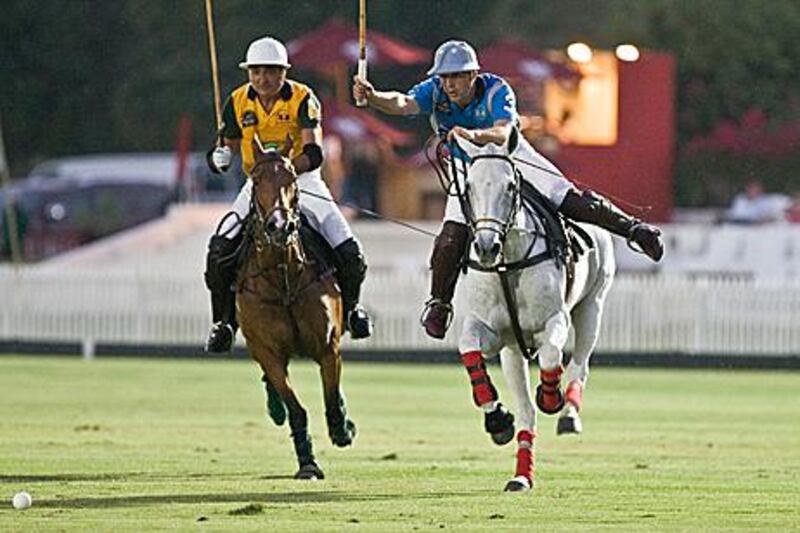When Lulu and Senorita, two seven-year-old mares, made their debuts in a polo competition they provided a breakthrough for Ghantoot Racing and Polo Club.
The mares are the first to come through a successful breeding programme at the club, the first in the Middle East, to make it to the big stage in this year's Ghantoot Gold Cup, one of the three major polo competitions in the country.
It was a proud moment for all those concerned in the breeding and training of the two mares to see them perform in the top tier competition.
"It is like seeing a one's own child grow up and then graduate from the university," said Sultan Muhammad, the resident manager of the club's breeding department.
However, their time taking part in top tournaments was short lived as Lulu and Senorita will not be competing anymore and are instead going to stud.
"Usually the mares with injuries and those retired are the ones to go for stud but both Lulu and Senorita are retired when they are still at the competitive level to speed up the process of a pure UAE bloodline," Muhammad said.
The breeding of polo ponies at Ghantoot is the brainchild of Sheikh Falah bin Zayed, the president of the club.
Since the establishment of the breeding section in 2003, Ghantoot has more than 80 local-bred ponies: foals, yearlings, some in training and some already in competition.
"It was Sheikh Falah's idea to venture into breeding our own polo ponies," Muhammad said. "Ghantoot imports around 20 to 25 polo ponies every year and still continues to do so.
"The breeding department is a long-term project with an objective of having the UAE's own polo ponies."
The country is already successful in breeding Purebred Arabians for flat racing and Sheikh Falah's plan is achieve the same with their own polo ponies. The horses are given the best care and attention and have top-class facilities, such as air-conditioned boxes.
"Initially, we started with around 15 to 20 mares and had around 12 foals from the first lot. Lulu and Senorita are two of them," Muhammed said. "Our first area of concern at the beginning was whether they passed all the conformations of a polo pony, and amazingly, they did.
"The horses were handed over to the training department after they reached the age of three. They are broken at first and then set for training."
According to Muhammad, polo is a demanding game for a horse and they need to be trained for two to three years before going into competition.
"They usually participate in four to five tournaments, exhibitions and friendly matches which mean the ponies are occupied totally for a period of six months," he said.
"Sheikh Falah's breeding programme is to have their own polo ponies notwithstanding the cost but to fulfil a mission in providing UAE with a breed of quality polo ponies," said Muhammad.
The polo ponies imported from Argentina may cost from US$5,000 (Dh18,364) to $70,000, depending on the quality. There are more than 140 ponies altogether in training throughout the year and those injured are replaced every season.
"We have 66 mares in breeding at the moment," Muhammad said. "It is such a joy to watch them grow to be potential polo ponies."
The programme has imported polo stallions from Argentina.
Muhammed said that the best time for the mares to give birth is early November, so that the foals can be put outside in the paddocks and enjoy the open area in a cooler climate.
"It is a great joy and reward when we see a healthy foal," he said.
Muhammad arrived in Abu Dhabi at the age of nine, when his father, Syed, decided to bring his family from Pakistan.
"My father was employed at the Royal Stables and I also grew up with the horses as we lived at the same premises," said Muhammad, 31, and the eldest of five.
He completed his education in Abu Dhabi and found employment at the Royal Stables.
"This is my job and I can't think of anything other than being involved in horses," he said. "I used to watch horses when my father was working for the Royal Stables.
"We are busy throughout the year. It is a continuous cycle. Generally we aim to have the foals by November, but that doesn't mean we have foals only in November. It can be anytime between Octobers to February, that's the timetable we have planned."






